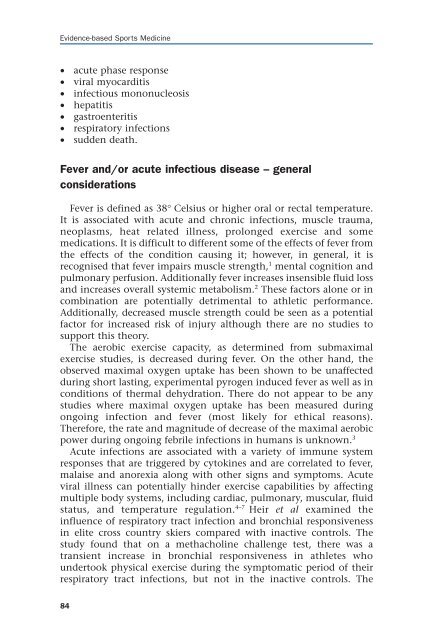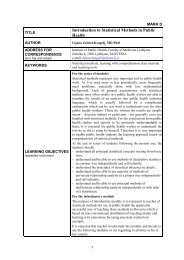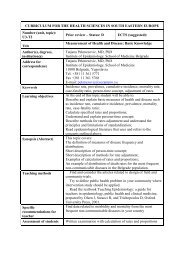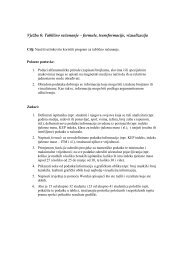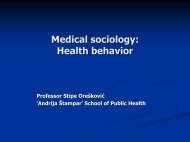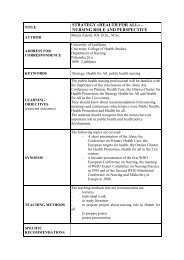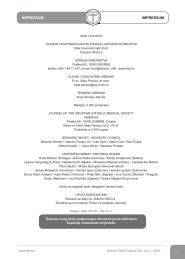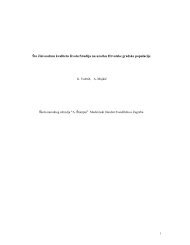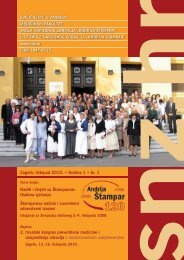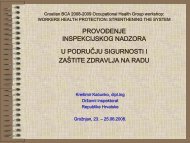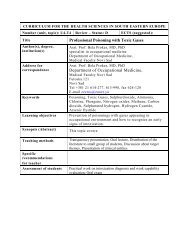- Page 2:
Evidence-based Sports Medicine
- Page 5 and 6:
© BMJ Books 2002BMJ Books is an im
- Page 7 and 8:
Evidence-based Sports MedicineSecti
- Page 10 and 11:
ContributorsRoald BahrProfessor and
- Page 12 and 13:
ContributorsPaul McCroryCentre for
- Page 14 and 15:
PrefaceSport is big business, high
- Page 16:
Section 1An introduction toevidence
- Page 19 and 20:
Evidence-based Sports MedicineMedic
- Page 21 and 22:
Evidence-based Sports Medicinecontr
- Page 23 and 24:
Evidence-based Sports Medicinesourc
- Page 25 and 26:
Evidence-based Sports MedicineKey m
- Page 27 and 28:
2: Methodology in researchLISA HODG
- Page 29 and 30:
Evidence-based Sports Medicineinves
- Page 31 and 32:
Evidence-based Sports MedicineKey m
- Page 33 and 34:
Evidence-based Sports MedicineStudi
- Page 35 and 36:
Evidence-based Sports Medicinenext
- Page 37 and 38:
Evidence-based Sports Medicinefor t
- Page 39 and 40:
Evidence-based Sports MedicineAppen
- Page 41 and 42:
Evidence-based Sports Medicine• V
- Page 43 and 44:
Evidence-based Sports MedicineRefer
- Page 45 and 46:
Evidence-based Sports Medicinehas b
- Page 47 and 48: Evidence-based Sports Medicine• d
- Page 49 and 50: Evidence-based Sports Medicineusefu
- Page 51 and 52: Evidence-based Sports Medicineprogr
- Page 53 and 54: Evidence-based Sports MedicineTable
- Page 55 and 56: Evidence-based Sports Medicine• P
- Page 57 and 58: Evidence-based Sports MedicineC It
- Page 60 and 61: 4: What is the role of icein soft t
- Page 62 and 63: The role of ice in soft tissue inju
- Page 64 and 65: The role of ice in soft tissue inju
- Page 66 and 67: The role of ice in soft tissue inju
- Page 68 and 69: The role of ice in soft tissue inju
- Page 70 and 71: Appendix 4.1 ContinuedEditors and/o
- Page 72 and 73: Appendix 4.1 ContinuedEditors and/o
- Page 74 and 75: Appendix 4.1 ContinuedEditors and/o
- Page 76 and 77: Appendix 4.1 ContinuedEditors and/o
- Page 78 and 79: The role of ice in soft tissue inju
- Page 80 and 81: The role of ice in soft tissue inju
- Page 82 and 83: Concussionsuffered “three concuss
- Page 84 and 85: ConcussionTable 5.1 Return to sport
- Page 86 and 87: ConcussionRecovery of neuropsycholo
- Page 88 and 89: ConcussionIn addition, Gerberich ac
- Page 90 and 91: Concussionrepair 101 and antioxidan
- Page 92 and 93: ConcussionKey messages1 No evidence
- Page 94 and 95: ConcussionSummarising the evidenceG
- Page 96 and 97: Concussion50 Shuttleworth-Jordan AB
- Page 100 and 101: Exercising with a fever and/or acut
- Page 102 and 103: Exercising with a fever and/or acut
- Page 104 and 105: Exercising with a fever and/or acut
- Page 106 and 107: Exercising with a fever and/or acut
- Page 108 and 109: Exercising with a fever and/or acut
- Page 110 and 111: Exercising with a fever and/or acut
- Page 112 and 113: 7: Does stretching helpprevent inju
- Page 114 and 115: Does stretching help prevent injuri
- Page 116 and 117: Does stretching help prevent injuri
- Page 118 and 119: Table 7.2 Brief summary of the clin
- Page 120 and 121: Does stretching help prevent injuri
- Page 122 and 123: Does stretching help prevent injuri
- Page 124 and 125: Table 7.4 Brief summary of the clin
- Page 126 and 127: Does stretching help prevent injuri
- Page 128 and 129: Does stretching help prevent injuri
- Page 130 and 131: Does stretching help prevent injuri
- Page 132 and 133: 8: Should you play sport withone ki
- Page 134 and 135: Should you play sport with one kidn
- Page 136 and 137: Should you play sport with one kidn
- Page 138 and 139: Should you play sport with one kidn
- Page 140 and 141: Should you play sport with one kidn
- Page 142 and 143: Should you play sport with one kidn
- Page 144 and 145: Should you play sport with one kidn
- Page 146 and 147: Should you play sport with one kidn
- Page 148 and 149:
Prevention of falls in older people
- Page 150 and 151:
Prevention of falls in older people
- Page 152 and 153:
Prevention of falls in older people
- Page 154 and 155:
Prevention of falls in older people
- Page 156 and 157:
Prevention of falls in older people
- Page 158 and 159:
Prevention of falls in older people
- Page 160 and 161:
Prevention of falls in older people
- Page 162 and 163:
Prevention of falls in older people
- Page 164 and 165:
Appendix 9.1 Summary of randomised
- Page 166 and 167:
Appendix 9.1 ContinuedArticle, stud
- Page 168 and 169:
Appendix 9.1 ContinuedArticle, stud
- Page 170 and 171:
Appendix 9.2 ContinuedArticle, stud
- Page 172 and 173:
Appendix 9.3 ContinuedArticle, stud
- Page 174 and 175:
Prevention of falls in older people
- Page 176:
Prevention of falls in older people
- Page 180 and 181:
10: Does regular exercisehelp in th
- Page 182 and 183:
Regular exercise and bronchial asth
- Page 184 and 185:
Regular exercise and bronchial asth
- Page 186 and 187:
Regular exercise and bronchial asth
- Page 188 and 189:
Regular exercise and bronchial asth
- Page 190 and 191:
Regular exercise and bronchial asth
- Page 192 and 193:
Regular exercise and bronchial asth
- Page 194 and 195:
Regular exercise and bronchial asth
- Page 196 and 197:
11: Does exercise help orharm in os
- Page 198 and 199:
Exercise and osteoarthritis of the
- Page 200 and 201:
Table 11.2 ContinuedStudy Design In
- Page 202 and 203:
Exercise and osteoarthritis of the
- Page 204 and 205:
Exercise and osteoarthritis of the
- Page 206 and 207:
Exercise and osteoarthritis of the
- Page 208 and 209:
Exercise and osteoarthritis of the
- Page 210 and 211:
Exercise and osteoarthritis of the
- Page 212 and 213:
Physical activity and weight lossea
- Page 214 and 215:
Physical activity and weight lossTa
- Page 216 and 217:
Physical activity and weight lossSu
- Page 218 and 219:
Physical activity and weight lossPh
- Page 220 and 221:
Physical activity and weight lossbe
- Page 222 and 223:
Physical activity and weight lossTa
- Page 224 and 225:
Physical activity and weight lossne
- Page 226 and 227:
Physical activity and weight lossCa
- Page 228 and 229:
Physical activity and weight loss3
- Page 230 and 231:
Physical activity and weight loss25
- Page 232 and 233:
Management of chronic low back pain
- Page 234 and 235:
Management of chronic low back pain
- Page 236 and 237:
Management of chronic low back pain
- Page 238 and 239:
Management of chronic low back pain
- Page 240 and 241:
Management of chronic low back pain
- Page 242 and 243:
Management of chronic low back pain
- Page 244 and 245:
Management of chronic low back pain
- Page 246 and 247:
Management of chronic low back pain
- Page 248 and 249:
Management of chronic low back pain
- Page 250 and 251:
Management of chronic low back pain
- Page 252 and 253:
Management of chronic low back pain
- Page 254 and 255:
14: How should you treatspondylolys
- Page 256 and 257:
Spondylolysis in the athleteradiogr
- Page 258 and 259:
Spondylolysis in the athletedegener
- Page 260 and 261:
Spondylolysis in the athleteMultipl
- Page 262 and 263:
Spondylolysis in the athleteFigure
- Page 264 and 265:
Spondylolysis in the athleteFigure
- Page 266 and 267:
Spondylolysis in the athleteTreatme
- Page 268 and 269:
Table 14.1 ContinuedStudy Design Di
- Page 270 and 271:
Spondylolysis in the athletetreatme
- Page 272 and 273:
Spondylolysis in the athleteobtaine
- Page 274 and 275:
Spondylolysis in the athleteand out
- Page 276 and 277:
Spondylolysis in the athleteC To de
- Page 278 and 279:
Spondylolysis in the athlete12 Lons
- Page 280 and 281:
Spondylolysis in the athlete65 Kato
- Page 282 and 283:
Exercise and prevention of osteopor
- Page 284 and 285:
Exercise and prevention of osteopor
- Page 286 and 287:
Exercise and prevention of osteopor
- Page 288 and 289:
Exercise and prevention of osteopor
- Page 290 and 291:
Exercise and prevention of osteopor
- Page 292 and 293:
Exercise and prevention of osteopor
- Page 294 and 295:
Exercise and prevention of osteopor
- Page 296 and 297:
Exercise and prevention of osteopor
- Page 298 and 299:
Exercise and prevention of osteopor
- Page 300:
Exercise and prevention of osteopor
- Page 304 and 305:
16: Are corticosteroid injectionsas
- Page 306 and 307:
Treatment of painful shoulderpublic
- Page 308 and 309:
Treatment of painful shouldertogeth
- Page 310 and 311:
Table 16.1 ContinuedFirst author Di
- Page 312 and 313:
Table 16.2 Interventions and short-
- Page 314 and 315:
Table 16.2 ContinuedFirst author [r
- Page 316 and 317:
Treatment of painful shoulderFirst
- Page 318 and 319:
Treatment of painful shoulderFirst
- Page 320 and 321:
Table 16.5 Interventions and short-
- Page 322 and 323:
Treatment of painful shoulderconduc
- Page 324 and 325:
Treatment of painful shoulderNevert
- Page 326 and 327:
Treatment of painful shoulderestima
- Page 328 and 329:
Treatment of painful shoulderB High
- Page 330 and 331:
Treatment of painful shoulder11 Win
- Page 332 and 333:
Treatment of painful shoulder56 Win
- Page 334 and 335:
First time dislocation of the shoul
- Page 336 and 337:
First time dislocation of the shoul
- Page 338 and 339:
First time dislocation of the shoul
- Page 340 and 341:
First time dislocation of the shoul
- Page 342 and 343:
First time dislocation of the shoul
- Page 344 and 345:
First time dislocation of the shoul
- Page 346 and 347:
Table 17.5 Studies of non-randomise
- Page 348 and 349:
First time dislocation of the shoul
- Page 350 and 351:
First time dislocation of the shoul
- Page 352 and 353:
First time dislocation of the shoul
- Page 354 and 355:
First time dislocation of the shoul
- Page 356 and 357:
First time dislocation of the shoul
- Page 358 and 359:
First time dislocation of the shoul
- Page 360 and 361:
First time dislocation of the shoul
- Page 362 and 363:
First time dislocation of the shoul
- Page 364 and 365:
First time dislocation of the shoul
- Page 366 and 367:
18: How should you treattennis elbo
- Page 368 and 369:
Treatment of tennis elbowCapsular a
- Page 370 and 371:
Treatment of tennis elbowhere. Chro
- Page 372 and 373:
Treatment of tennis elbowevidence t
- Page 374 and 375:
Treatment of tennis elbowmedication
- Page 376 and 377:
Treatment of tennis elbowreleased.
- Page 378 and 379:
Treatment of tennis elbowapplicatio
- Page 380 and 381:
Treatment of tennis elbow2 With reg
- Page 382:
Treatment of tennis elbow16 Grundbe
- Page 386 and 387:
19: How reliable is the physicalexa
- Page 388 and 389:
Diagnosis of sports related knee in
- Page 390 and 391:
Diagnosis of sports related knee in
- Page 392 and 393:
Diagnosis of sports related knee in
- Page 394 and 395:
Diagnosis of sports related knee in
- Page 396 and 397:
Diagnosis of sports related knee in
- Page 398 and 399:
Diagnosis of sports related knee in
- Page 400 and 401:
Diagnosis of sports related knee in
- Page 402 and 403:
Diagnosis of sports related knee in
- Page 404 and 405:
20: How do you treat chronicgroin p
- Page 406 and 407:
How do you treat chronic groin pain
- Page 408 and 409:
How do you treat chronic groin pain
- Page 410 and 411:
How do you treat chronic groin pain
- Page 412 and 413:
How do you treat chronic groin pain
- Page 414 and 415:
How do you treat chronic groin pain
- Page 416 and 417:
How do you treat chronic groin pain
- Page 418 and 419:
How do you treat chronic groin pain
- Page 420 and 421:
21: What is the optimaltreatment of
- Page 422 and 423:
Optimal treatment of the acute ACL
- Page 424 and 425:
Optimal treatment of the acute ACL
- Page 426 and 427:
Optimal treatment of the acute ACL
- Page 428 and 429:
Optimal treatment of the acute ACL
- Page 430 and 431:
Optimal treatment of the acute ACL
- Page 432 and 433:
Optimal treatment of the acute ACL
- Page 434 and 435:
Optimal treatment of the acute ACL
- Page 436 and 437:
Optimal treatment of the acute ACL
- Page 438 and 439:
Treatment for patellar tendinopathy
- Page 440 and 441:
Treatment for patellar tendinopathy
- Page 442 and 443:
Treatment for patellar tendinopathy
- Page 444 and 445:
Treatment for patellar tendinopathy
- Page 446 and 447:
Treatment for patellar tendinopathy
- Page 448 and 449:
Treatment for patellar tendinopathy
- Page 450 and 451:
Appendix 22.2 Randomised trials wit
- Page 452 and 453:
Appendix 22.4 Randomised controlled
- Page 454 and 455:
Treatment for patellar tendinopathy
- Page 456:
Treatment for patellar tendinopathy
- Page 460 and 461:
23: How evidence-based isour clinic
- Page 462 and 463:
Clinical examination of the ankleDa
- Page 464 and 465:
Clinical examination of the ankle2
- Page 466 and 467:
24: Is taping helpful forankle spra
- Page 468 and 469:
Is taping helpful for ankle sprains
- Page 470 and 471:
Is taping helpful for ankle sprains
- Page 472 and 473:
Is taping helpful for ankle sprains
- Page 474 and 475:
Is taping helpful for ankle sprains
- Page 476 and 477:
Is taping helpful for ankle sprains
- Page 478 and 479:
Is taping helpful for ankle sprains
- Page 480 and 481:
Is taping helpful for ankle sprains
- Page 482 and 483:
Is taping helpful for ankle sprains
- Page 484 and 485:
Is taping helpful for ankle sprains
- Page 486 and 487:
Can we prevent ankle sprains?• th
- Page 488 and 489:
Can we prevent ankle sprains?conclu
- Page 490 and 491:
Can we prevent ankle sprains?The re
- Page 492 and 493:
Can we prevent ankle sprains?group
- Page 494 and 495:
Can we prevent ankle sprains?(25%,
- Page 496 and 497:
Can we prevent ankle sprains?than i
- Page 498 and 499:
Can we prevent ankle sprains?Figure
- Page 500 and 501:
Can we prevent ankle sprains?2 Whic
- Page 502 and 503:
Appendix 25.1 ContinuedStudy Year S
- Page 504 and 505:
Can we prevent ankle sprains?Summar
- Page 506 and 507:
26: How should you treata stress fr
- Page 508 and 509:
Treatment of a stress fracturedetai
- Page 510 and 511:
Treatment of a stress fractureElect
- Page 512 and 513:
Treatment of a stress fractureto al
- Page 514 and 515:
Treatment of a stress fractureTable
- Page 516 and 517:
Treatment of a stress fractureshoes
- Page 518 and 519:
Treatment of a stress fractureindiv
- Page 520 and 521:
Treatment of a stress fractureTable
- Page 522 and 523:
Treatment of a stress fractureTable
- Page 524 and 525:
Treatment of a stress fracture• R
- Page 526 and 527:
Treatment of a stress fractureSumma
- Page 528 and 529:
Treatment of a stress fracture29 O
- Page 530 and 531:
Treatment of a stress fracture78 Sh
- Page 532 and 533:
Treatment of a stress fracture126 W
- Page 534 and 535:
Subcutaneous rupture of the Achille
- Page 536 and 537:
Subcutaneous rupture of the Achille
- Page 538 and 539:
Table 27.1 Summary of management of
- Page 540 and 541:
Table 27.1 ContinuedType of Period
- Page 542 and 543:
Subcutaneous rupture of the Achille
- Page 544 and 545:
Table 27.2 Synopsis of articles ana
- Page 546 and 547:
Subcutaneous rupture of the Achille
- Page 548 and 549:
Subcutaneous rupture of the Achille
- Page 550 and 551:
Subcutaneous rupture of the Achille
- Page 552 and 553:
Subcutaneous rupture of the Achille
- Page 554 and 555:
Subcutaneous rupture of the Achille
- Page 556 and 557:
Subcutaneous rupture of the Achille
- Page 558 and 559:
How do you manage plantar fasciitis
- Page 560 and 561:
How do you manage plantar fasciitis
- Page 562 and 563:
How do you manage plantar fasciitis
- Page 564 and 565:
How do you manage plantar fasciitis
- Page 566 and 567:
How do you manage plantar fasciitis
- Page 568 and 569:
How do you manage plantar fasciitis
- Page 570 and 571:
How do you manage plantar fasciitis
- Page 572 and 573:
How do you manage plantar fasciitis
- Page 574:
How do you manage plantar fasciitis
- Page 577 and 578:
Evidence-based Sports MedicineChapt
- Page 579 and 580:
Indexincidence 470pain 446physical
- Page 581 and 582:
Indexcardiometabolic health 201, 20
- Page 583 and 584:
Indexsurgical treatment of tennis e
- Page 585 and 586:
Indexsubmission of papers 36see als
- Page 587 and 588:
Indexstiffness, stretching-induced
- Page 589 and 590:
Indexnight splints 550-1radiofreque
- Page 591 and 592:
Indexdiagnosis and difficulties in
- Page 593:
Indextraining errors, stress fractu


